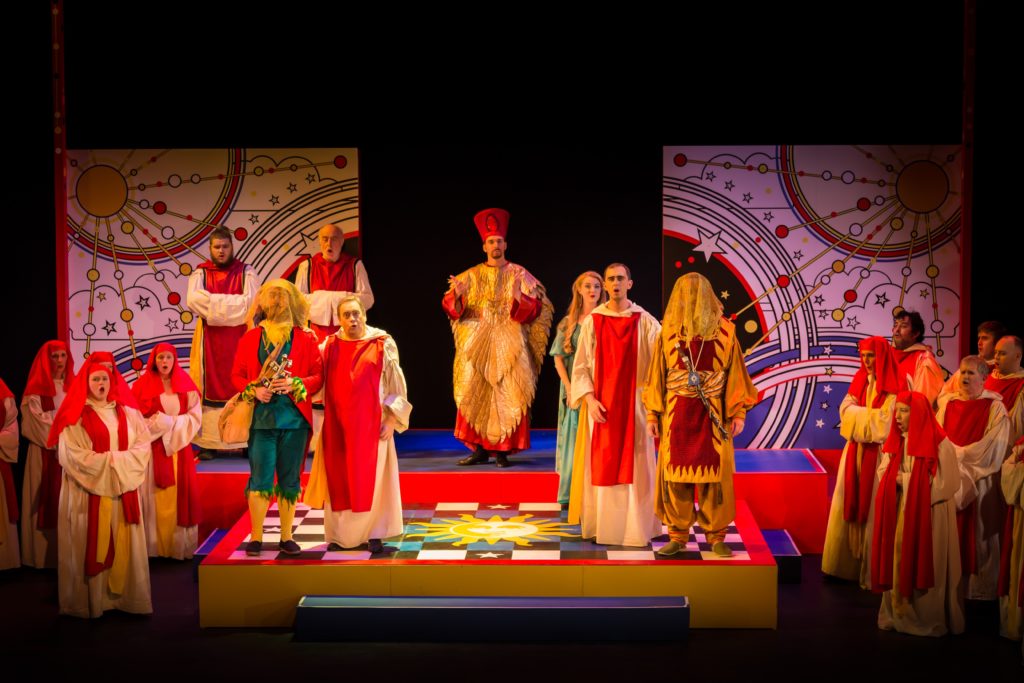
The Magic Flute, York Opera, at York Theatre Royal, tonight and Friday, 7.15pm; Saturday, 4pm. Box office: 01904 623568 or at yorktheatreroyal.co.uk
AFTER 20 frustrating months, York Opera is back where it belongs – on the Theatre Royal stage. We may all rejoice.
Running an opera company is backbreaking work at the best of times. Covid has been making it a whole heap harder. Mozart’s last opera would not necessarily be an automatic choice after so long a lay-off and is certainly not an easy option. But the company has dug deep and delivers the goods in a splendid revival of John Soper’s traditional production, first seen in 2009.
In the distribution of laurels, there are many individuals to compliment. But one entity stands out. Derek Chivers’s 20-piece band, using an excellent orchestral reduction by Kenneth Roberts, takes the score by storm.

On opening night they began untidily, to be sure, but halfway through the overture there was no stopping them, inspired by a woodwind quartet of the highest calibre whose colourings and accuracy are a marvel throughout. Claire Jowett, a stalwart of so many groups, offers untiring leadership of the strings. One member, James Sanderson, slips in and out of the pit as player of the magic bells when not singing First Priest, a unique double act.
The singers clearly relish such a strong foundation. Foremost among them is Heather Watts, who returns to deliver another impeccable Queen of Night, fiery coloratura spiced with menacing gesture, a thrilling performance by any standards. David Valsamidis makes a witty, amiable Papageno, whose superb diction is allied to a warm baritone. Unlike some, he never forgets his audience.
Alexandra Mather is a fetching Pamina, whose emotions are conveyed not only by her clear soprano but also by complementary facial expressions, a valuable asset. Her Tamino is Hamish Brown, who takes the role that illness denied him last time round. His tendency to jerky movement undermines his princeliness, but his accurate if pinched tenor covers the ground well.
Monostatos might suit his personality better. That role goes to Ian Thomson-Smith, last time’s Papageno. He sings it musically but without quite the venom this nasty character demands. The Sarastro of Mark Simmonds is clad much like an orthodox priest; his bass is a little underpowered at the bottom of the range, but otherwise firm and decisive.

Lesser roles are covered with distinction, reaffirming the company’s strength in depth. Clive Goodhead is an authoritative Speaker, doubling as an Armed Man (here described as Guardian of Fire), while Elizabeth Vile is a vivid Papagena.
I was much taken by the three Genies, Victoria Beale, Hannah Just and Maggie Smales – standing in for the usual ‘Boys’ – blending superbly like their rich white brocades, breeches and tricorns. Equally impressive are the spear-carrying Three Ladies, Annabel van Griethuysen, Rebecca Smith and Maggie Soper, a determined trio.
The chorus seems to have acquired some new blood and sounds fresh and committed. They are also very disciplined, moving with intent but keeping still when merely onlookers, which is easier said than done. I had forgotten how rich Maggie Soper’s costumes are, distinctive and a feast for the eye. A word, too, for Eric Lund’s nicely varied lighting.
John Soper’s own masonic-style permanent set fits the bill well: two panels of stars and planets divided by gold triangles and circle, with a chessboard platform in front. If it were a little closer to front-stage, some of the solo voices would resonate better than they do from further back. His production is now even more slick than before and more clearly organised; he merely needs to get some of the spoken dialogue better projected. But this is a cheering evening in so many ways and deserves widespread support.
Review by Martin Dreyer


Thank you on behalf of York Opera to both Martin Dreyer and Charles Hutchinson for covering this production so well and so professionally. Thanks too to our audiences for helping us get back on our feet. Clive Goodhead, President of York Opera.